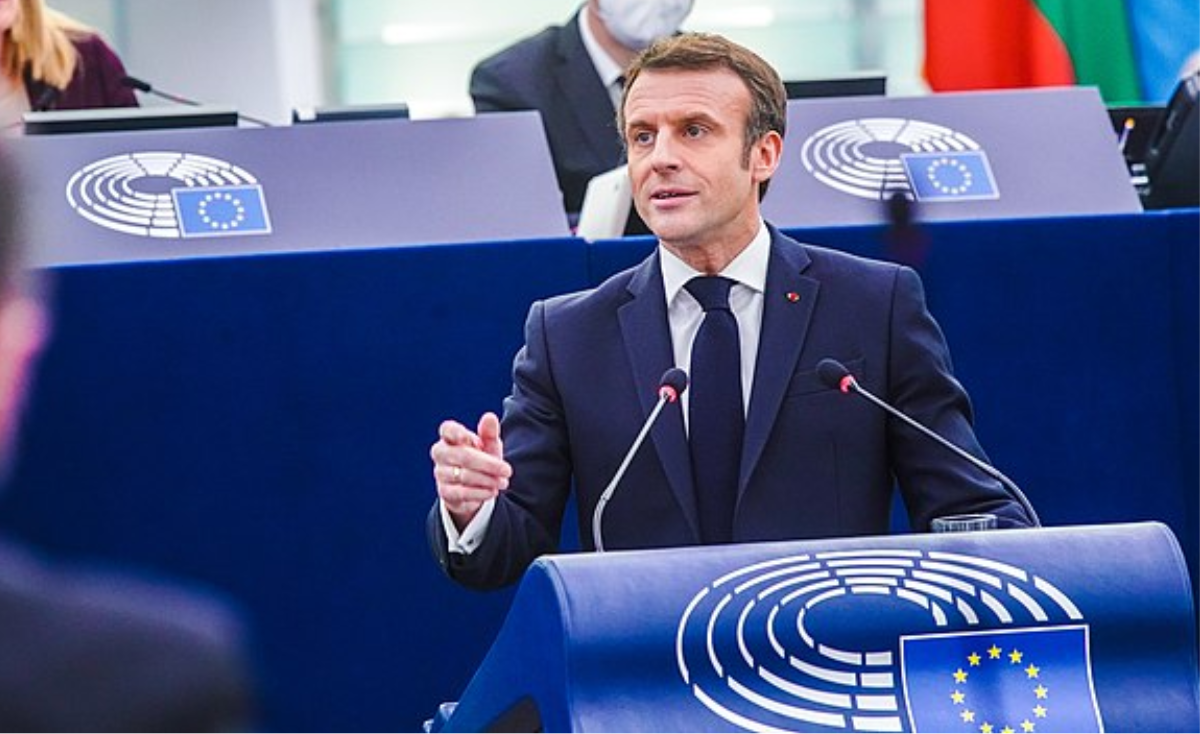 CC-BY-4.0: © European Union 2022 – Source: EP (via Wikimedia Commons).
CC-BY-4.0: © European Union 2022 – Source: EP (via Wikimedia Commons).
French President Emmanuel Macron has joined calls from German Chancellor Friedrich Merz to scrap the Corporate Sustainability Due Diligence Directive (CSDDD).
The law would require companies to assess and prevent negative human rights and environmental impacts in their value chain.
It is currently subject to changes as part of the Omnibus proposal. Under the Omnibus, implementation of the CSDDD has already been delayed by a year to 2028. Proposals have also been made to dilute the rules and ease the burden on companies.
As part of the CSDDD, domestic regulators will supervise and have the capability to undertake inspections and probes and administer penalties for infractions capped at 5% of the company's worldwide net revenue. According to DLA Piper, the directive establishes a right to a civil remedy for victims of corporate contraventions of human rights and environmental benchmarks, as it augments avenues to justice and elevates potential litigation vulnerabilities.
The directive will be enacted progressively according to company size and revenue:
- Corporations with over 5,000 employees and €1.5 billion in turnover from 26 July 2027.
- Companies with over 3,000 employees and €900 million in turnover from 26 July 2028.
- Every other organisation is included from 26 July 2029. These businesses have over 1,000 personnel and €450 million in revenue.
The CSDDD is important to fund operators and other operations teams as transition costs, including expenditure and investments to adapt a company’s own operations and value chains to comply with the due diligence obligation, if needed, must be met. This could directly affect the firm’s budgets and workloads of staff.
Then there are the less tangible effects of adhering to the rules when doing due diligence on companies being invested in via the fund.
""We are aligned now with Chancellor Merz… CSDDD and other regulations have to not
just be postponed for one year, but to be put out of the table."
The stance has annoyed some in the market who claim sustainability and good business are being used as a scapegoat for poor economic realities. “The fundamental need for sustainability due diligence remains unchanged,” said Stefan Premer, Director of Sustainability Consulting at Sphera, a Blackstone-owned global provider of supply chain and risk management software, data and consulting services. “Removing these regulations does not eliminate the need for companies to understand and manage sustainability risks.”
Macron said Brussels lawmakers wanted to go further, telling global business leaders at a Choose France International Business Summit, "Clearly we are very aligned now with Chancellor Merz… CSDDD and some other regulations have to not just be postponed for one year, but to be put out of the table."
In response to this statement, trade publication Responsible Investor said that Denmark’s minister for industry and business told them they were disinclined to agree with the ideas from the EU's two largest economies.
The French and German leaders reportedly view the rules as overly burdensome and harmful to European competitiveness.
The eurozone economy expanded by 0.4% in the first quarter of 2025, according to preliminary figures released by Eurostat in April. Amid other macroeconomic factors, there is concern that some of the trade war rhetoric could have hurt the shoots of recovery after a stagnant few years of growth in Europe. This week, the German federal Labour office figures showed the number of unemployed people increased by 34,000 in seasonally adjusted terms to 2.96 million, approaching the three million mark for the first time in the past decade.
This compares to the US where GDP decreased at an annual rate of 0.3% in the first quarter of 2025, according to the advance estimate released by the US Bureau of Economic Analysis (BEA). In the fourth quarter of 2024, real GDP increased 2.4%. US BEA said the decrease in real GDP in the first quarter primarily reflected an increase in imports, which are a subtraction in the calculation of GDP, and a decrease in government spending.
European worries
CSDDD has long been a political football and whether it oversteps the scope of what is needed around due diligence or will make Europe less competitive.
If Merz and Macron are against the CSDDD, the rules could be changed or watered down or scrapped altogether which, while likely to be viewed positively by impacted companies, may expose investors and other stakeholders to greater supply chain and climate-related risks.
But what does the EU stand to lose if it backs away from holding businesses accountable for environmental and human rights risks in their supply chains?
Premer said the current pushback on the CSDDD and the Corporate Sustainability Reporting Directive (CSRD) by some EU and national bodies were “a short-sighted response to geopolitical pressures and concerns over administrative burdens”.
“Framing sustainability regulations as barriers to competitiveness will not help tackle other critical issues in European countries like tax disparities and bureaucratic inefficiencies,” he said. “Sustainability regulations are here to stay. As the physical and social impacts of climate change continue to emerge, companies will increasingly see sustainability regulations and their standards and methods as key for ensuring competitive differentiator.”
Premer added that companies must assess both the sustainability performance and risks within their supply chains – not to comply with regulations, but “because it directly impacts business performance, affects investor valuation, customer perception, costs and legal charges, and long-term market value”.
“This includes evaluating environmental impacts (such as GHG emissions from sourced materials and products, land use, water consumption, and biodiversity loss) as well as social and human rights issues,” he said, which included issues such as child labour risks and working conditions.
“This is why also financial bodies/investors or also businesses criticise these
pushbacks by national governments, as they are aware of the direction."
“The Corporate Sustainability Due Diligence Directive (CSDDD) – alongside frameworks like the German LKSG, which served as a precursor – offers a critical opportunity to standardise these assessments across sectors,” he said.
It means, he added, that a harmonised approach will likely have complexity and costs, compared to each company developing its own method in isolation. “This is why also financial bodies/investors or also businesses criticise these pushbacks by national governments, as they are aware of the direction,” he said.
Again, according to Responsible Investor, the draft supports reducing the scope of CSRD reporting by 80%, applying it only to large companies, while encouraging voluntary reporting from SMEs. It also proposes easing CSDDD obligations, shifting due diligence reviews from annual to every three years and limiting company liability for indirect impacts unless credible information is ignored. Penalties of up to 5% of global turnover are proposed for non-compliance.
Comparisons with the CSRD
The CSRD aspect could also be key.
According to new research that identifies significant inaccuracies in standard carbon measurement methodologies. Analysis by Carbon Responsible compared traditional Environmentally Extended Input Output (EEIO) models with verified 2023 emissions data from FTSE 100 companies.
In the research, they found that traditional carbon estimation models were missing the mark on Scope 3 emissions by up to 2,480%. The study compared widely used EEIO estimates to Ada, an AI-powered emissions engine, benchmarking against verified 2023 emissions data across a sample of FTSE 100 companies.
This could be crucial as it could change Scope 3 emissions reporting and change administration and operational due diligence work for operations teams.
“While traditional EEIO methods showed divergences as high as 2,480% from verified data, Ada's technology reduced measurement inaccuracy to just 80% – making it 30 times more accurate, or a 97% improvement in precision,” said Carbon Responsible’s report on the findings.
"When you're 97% more accurate than the industry standard, you're no longer in the realm of estimation – you're capturing investment-grade data," said Matthew Paver, COO of Carbon Responsible.
"“What’s being accepted in ESG reports today would never
pass an audit in a financial statement."
It’s not just the European regulators on the tightening path; worldwide tightening requirements for emissions reporting are being investigated and enforced. Both the CSRD and the US SEC climate rule now mandate traceable, up-to-date, and auditable emissions data – placing firms using outdated measurement methods at growing financial, regulatory, and reputational risk.
Scope 3 emissions – which include supply chain, investment, and product-use emissions – can account for more than 80% of a company’s carbon footprint yet have remained notoriously difficult to measure. EEIO, the globally accepted methodology for estimating carbon emissions using spend-based data, is endorsed by global frameworks including the GHG Protocol and the Partnership for Carbon Accounting Financials (PCAF).
“We’re seeing emissions disclosures based on proxies from six years ago – and regulators are starting to notice,” said Matthew Paver, Chief Operating Officer of Carbon Responsible. “What’s being accepted in ESG reports today would never pass an audit in a financial statement. Procurement, risk modelling, capital allocation – all now demand a firmer grasp of emissions data. Even if it feels like attention is shifting away right now, the CFO’s office can no longer afford to treat carbon as a compliance footnote.”
With all the complexities for companies around the new and not-so-new frameworks, there will be a distinct need for clarity in the coming months.
Please Sign In or Register to leave a Comment.
SUBSCRIBE
Get the recent popular stories straight into your inbox







